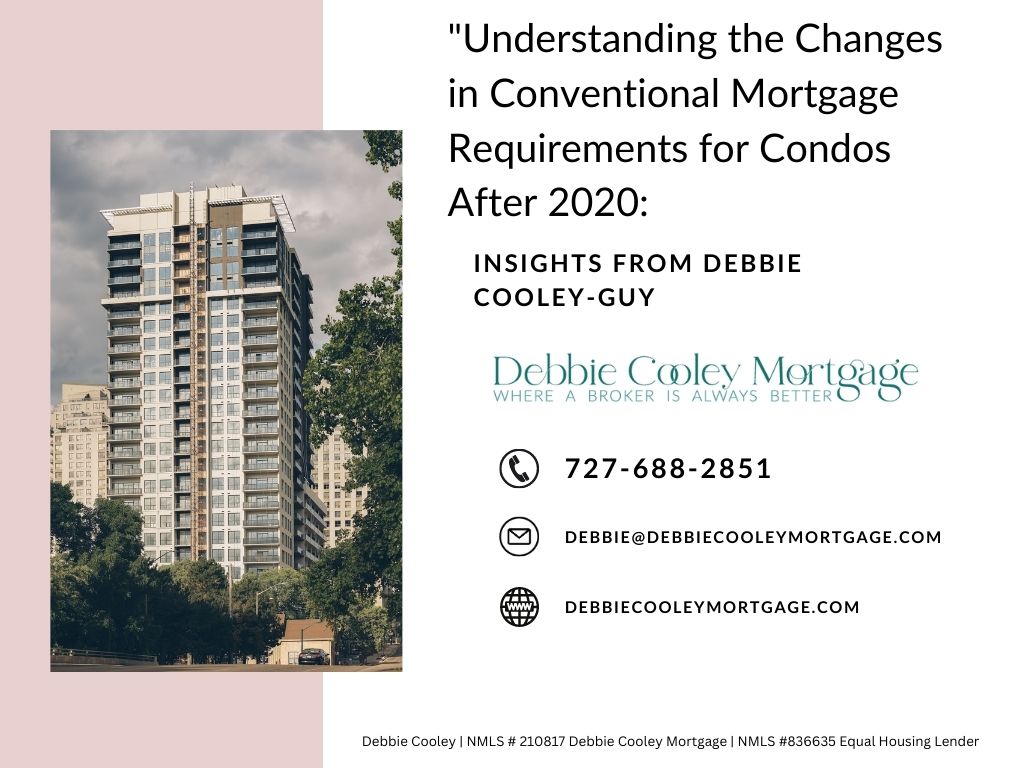“Understanding the Changes in Conventional Mortgage Requirements for Condos After 2020: Insights from Debbie Cooley Mortgage
In 2020, the COVID-19 pandemic brought significant changes to the real estate market, including changes in the requirements for conventional mortgages for condos. Before the pandemic, the requirements were relatively relaxed, but after 2020, lenders began to tighten their standards to reduce risk and protect their investments.
What is a Conventional Mortgage?
First, it’s essential to understand what a conventional mortgage is. A conventional mortgage is a loan that is not backed by the government, such as a VA or FHA loan. Conventional mortgages are typically used for higher-priced properties, and lenders require a higher credit score and a larger down payment than government-backed loans.
Financial Health of the Homeowners’ Association
One of the most significant changes has been an increased focus on the financial health of the homeowners’ association (HOA) that governs the condo complex. Lenders are now requiring more detailed financial statements, including budgets, reserves, and insurance policies. They want to ensure that the HOA is financially stable and has enough money set aside to cover unexpected expenses.
Short-Term Rentals
Short-term rentals, such as those booked through Airbnb, have become increasingly popular in recent years. However, lenders are now wary of condos that allow these types of rentals. They see them as a potential liability because short-term renters may not be as invested in the community as long-term residents. Lenders may require a certain percentage of owner-occupied units before approving a loan.
Higher Reserves
In addition to reviewing the HOA’s reserves, lenders are also requiring borrowers to have higher reserves. These reserves are typically six to twelve months of mortgage payments and are designed to ensure that borrowers can continue to make payments if they experience financial hardship.
Stricter Appraisals
Lenders are now requiring more detailed appraisals of condos before approving a loan. The appraiser must evaluate not only the individual unit but also the overall health of the condo complex. They may also look at comparable sales data and consider factors such as location, amenities, and square footage.
Higher Credit Scores
Finally, lenders are now requiring higher credit scores for borrowers who want to purchase a condo. In the past, borrowers with credit scores in the low 600s could still qualify for a conventional mortgage. Now, lenders are looking for credit scores in the mid-to-high 600s or even into the 700s.
Working with a Mortgage Professional
Navigating the requirements for conventional mortgages for condos can be challenging, especially in light of the recent changes. That’s where a mortgage professional like Debbie Cooley Mortgage can help. Debbie has years of experience in financing condos and can guide you through the process, helping you find the loan that best fits your needs.
In conclusion, the requirements for conventional mortgages for condos have changed significantly since 2020. Lenders are now requiring more detailed financial statements, higher reserves, stricter appraisals, and higher credit scores. These changes are designed to reduce risk and protect the lender’s investment. If you’re considering purchasing a condo, it’s essential to be aware of these requirements and work with a lender who understands them, like Debbie Cooley Mortgage.
#ConventionalMortgage #CondoFinancing #RealEstateMarket #COVID19Impact #FinancialHealth #ShortTermRentals #Reserves #StricterAppraisals #HigherCreditScores #MortgageProfessional #DebbieCooleyMortgage #NavigatingRequirements #ReducingRisk #ProtectingInvestments
Debbie Cooley Mortgage | NMLS #836635
Debbie Cooley Guy, Loan Originator NMLS #210817
Equal Housing Lender
